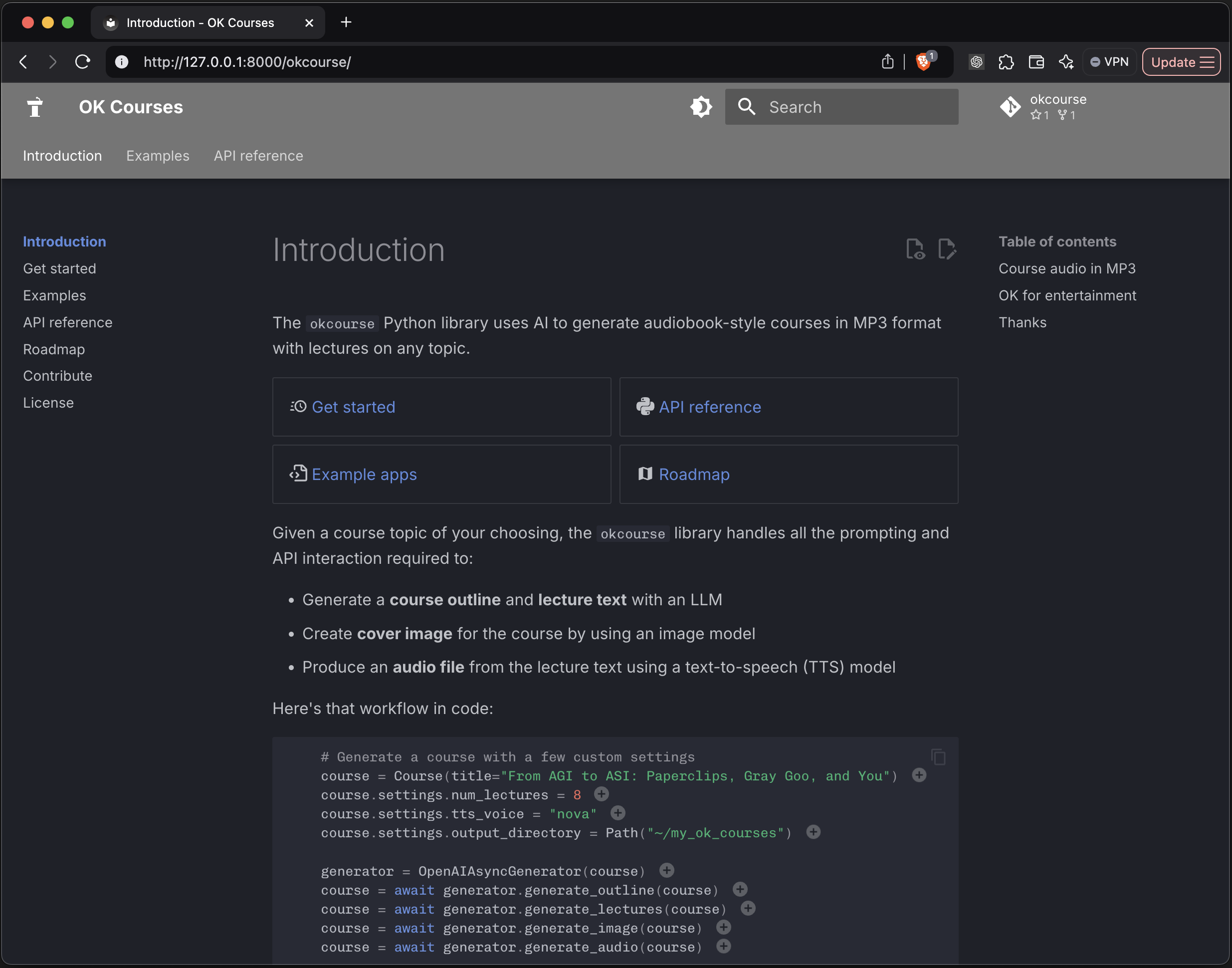You're encouraged to contribute your awesome code and doc skills to the okcourse project. Set up your dev environment and get hacking!
-
Experience with Python and Markdown or a healthy curiousity and ability to "learn by doing."
The
okcoursecodebase uses Python features up to and including those in Python 3.12. -
Credentials for an AI model service provider's API.
OpenAI is the first provider supported by
okcourse, so that's a good one to start with unless you're adding support for a new model provider.
Install uv by Astral if you don't already have it.
Though not strictly required to contribute to okcourse, many people find using uv to work with Python projects much easier than with other tools. In fact, uv will even install Python for you!
You are welcome to use python -m venv, Poetry, or another tool to create and manage your Python environments, but this project uses uvand so will these instructions.
-
Fork the mmacy/okcourse repository on GitHub.
-
Clone your fork with
gitand then enter the cloned repo's root directory:# Clone your fork of the repo with SSH git clone [email protected]:USER/okcourse.git # Enter repo root dir cd okcourse
Replace
USERwith your GitHub username.
The okcourse library looks for API credentials in an environment variable when creating the API client. The credentials are typically an API key that grant the client access to the AI service provider's models.
!!! warning
The API key owner is responsible for any API usage fees incurred by using that key to generate content with the `okcourse` library.
Using okcourse to generate course content may cost you, your employer, or whomever owns the API key real money. The library doesn't yet support locally hosted AI models, so until you or I add that support, you'll likely be paying someone to use their models.
After you've forked and cloned the repo, set the environment variable required by your AI model provider.
| AI model provider | Set this environment variable |
|---|---|
| OpenAI | OPENAI_API_KEY |
| Anthropic | not yet supported |
| not yet supported | |
| Locally hosted | not yet supported |
Create a branch, write some code in your favorite editor, push it to your fork, and open a PR in the upstream mmacy/okcourse repo.
This project aspires to adhere to the Google Python Style Guide and Pythonic coding principles, the latter of which are as follows:
$ uv run python
Python 3.12.7 (main, Oct 16 2024, 07:12:08) [Clang 18.1.8 ] on darwin
Type "help", "copyright", "credits" or "license" for more information.
>>> import this
The Zen of Python, by Tim Peters
Beautiful is better than ugly.
Explicit is better than implicit.
Simple is better than complex.
Complex is better than complicated.
Flat is better than nested.
Sparse is better than dense.
Readability counts.
Special cases aren't special enough to break the rules.
Although practicality beats purity.
Errors should never pass silently.
Unless explicitly silenced.
In the face of ambiguity, refuse the temptation to guess.
There should be one-- and preferably only one --obvious way to do it.
Although that way may not be obvious at first unless you're Dutch.
Now is better than never.
Although never is often better than *right* now.
If the implementation is hard to explain, it's a bad idea.
If the implementation is easy to explain, it may be a good idea.
Namespaces are one honking great idea -- let's do more of those!
>>>To contribute to okcourse documentation, you should be able to stage and view the docs locally.
Install the dependencies required by mkdocs-material with uv:
# Install doc dependencies
uv sync --group docsStart the local hot reload-enabled web server:
# Start MkDocs built-in webserver
uv run mkdocs serveAnd finally, navigate to the Serving on ... URL in the output and add or edit docs, verifying they look OK along the way.
$ uv run mkdocs serve
INFO - Building documentation...
INFO - git-committers plugin ENABLED
INFO - git-committers: found page authors cache file - loading it
INFO - Cleaning site directory
INFO - git-committers: fetching contributors for docs/roadmap.md
INFO - git-committers: saving page authors cache file
INFO - Documentation built in 6.80 seconds
INFO - [16:28:08] Watching paths for changes: 'docs', 'mkdocs.yml', 'README.md', 'src/okcourse', 'examples'
INFO - [16:28:08] Serving on http://127.0.0.1:8000/okcourse/The documentation should appear in your browser, similar to the following:
